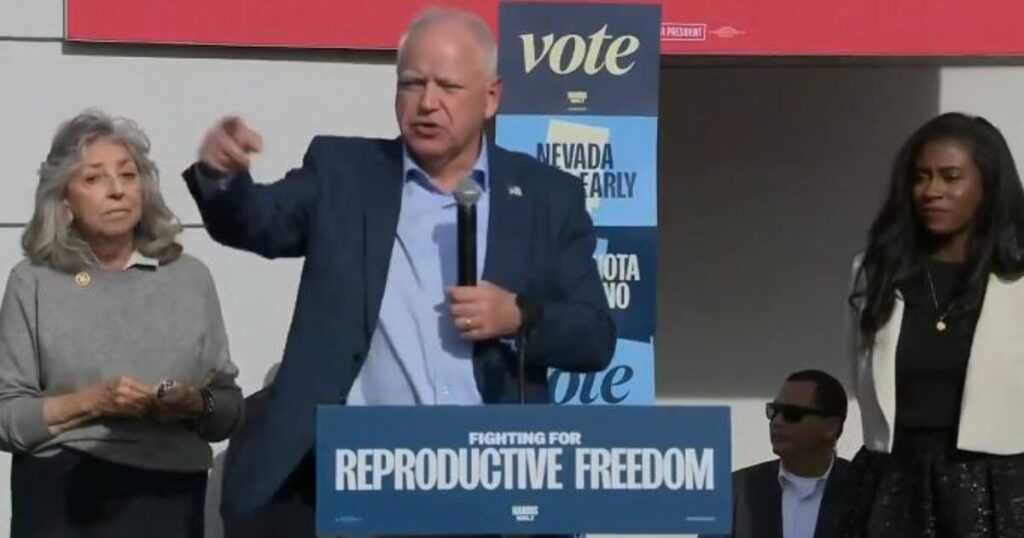In recent political discourse, Minnesota Governor Tim Walz and former Secretary of State Hillary Clinton have ignited controversy surrounding a rally held by Donald Trump at Madison Square Garden (MSG) in New York. During his remarks, Walz drew parallels between the Trump rally and a notable rally held in the 1930s, suggesting that the atmosphere was reminiscent of a time when extremist ideologies were on the rise in Europe. According to Walz, Trump’s rhetoric and actions in recent weeks have led to a disturbing descent into madness, a claim he urged listeners to verify through research. This assertion played into the broader narrative that identifies Trump supporters with historical manifestations of Nazism, generating fervent responses from both supporters and detractors alike.
Clinton amplified the charged atmosphere by accusing attendees of the GOP rally of harboring Nazi-like sentiments, framing the event as a reenactment of a significant rally that took place in 1939. Speaking on CNN with host Kaitlan Collins, she referenced a supposed connection between Trump’s current rhetoric and that of the fascist supporters present at the historic MSG rally. Clinton’s comments were particularly notable given their timing—just 12 days before the upcoming election, thus reflecting the heightened political tensions and urgency felt by many Democrats as they sought to galvanize their base against Trump and his supporters.
The exchange of accusations escalated with the reiteration of a controversial claim by Trump’s former Chief of Staff, John Kelly, who suggested that Trump had referenced Hitler as having done “some good things.” This assertion, widely regarded as incendiary, was utilized by Clinton to further characterize the atmosphere at Trump’s MSG rally. She emphasized the historical significance of the original Madison Square Garden rally, which highlighted the presence of American fascists aligning themselves with Nazi Germany, underscoring her assertion that the GOP rally could similarly echo such troubling elements of history.
Critics of Walz and Clinton have reacted strongly to these parallels drawn between modern-day Trump supporters and historical Nazi sympathizers. Supporters of Trump have characterized the rhetoric as a desperate and unfounded smear, arguing that it reflects a profound misunderstanding or mischaracterization of the motivations and beliefs of those attending the rally. The labeling of Trump supporters as “Nazis” has become emblematic of what many see as hyperbole and political opportunism, which, they argue, undermines meaningful discourse within the fraught landscape of American politics.
The exchange became emblematic of the broader disconnect between Trump’s base and mainstream Democrat narratives, which often invoke historical anti-fascist rhetoric to frame contemporary political opponents. Critics, including Trump himself, have dismissed these claims as “sick stuff,” accusing Walz and Clinton of resorting to sensationalism out of frustration over their party’s inability to counter Trump’s popularity. These confrontations have intensified the partisan divide, stifling opportunities for constructive dialogue and complicating efforts to bridge gaps between differing political philosophies.
In summary, the politically charged atmosphere surrounding Trump’s Madison Square Garden rally garnered intense scrutiny from figures like Tim Walz and Hillary Clinton as they sought to draw parallels with historical incidents of fascism in America. Their remarks reflect deep-seated anxieties regarding the rise of extremist rhetoric in contemporary politics and illustrate how historical references are wielded on the modern political stage. Meanwhile, supporters of Trump rally vehemently push back against such characterizations, framing the accusations as politically motivated exaggerations that further entrench divisions within the political landscape. The discourse exemplifies the challenges faced in American politics today, where historical analogies can provoke vigorous debate and ire, and highlight the complexities surrounding populism, nationalism, and the resonances of history.

